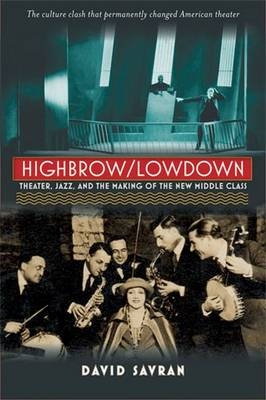
Highbrow/Lowdown
Theater, Jazz, and the Making of the New Middle Class
Seiten
2009
The University of Michigan Press (Verlag)
978-0-472-11692-8 (ISBN)
The University of Michigan Press (Verlag)
978-0-472-11692-8 (ISBN)
- Titel ist leider vergriffen;
keine Neuauflage - Artikel merken
The arrival of jazz in the early part of the twentieth century sparked a cultural revolution that was impossible to contain. The music affected every stratum of US society and culture, confusing and challenging long-entrenched hierarchies based on class, race, and ethnicity. This title explores this culture war.
Highbrow/Lowdown explores the twentieth century's first culture war and the forces that permanently transformed American theater into the art form we know today. The arrival of jazz in the 1920s sparked a cultural revolution that was impossible to contain. The music affected every stratum of U.S. society and culture, confusing and challenging long-entrenched hierarchies based on class, race, and ethnicity. But jazz was much more than the music---it was also a powerful cultural force that brought African American, Jewish, and working-class culture into the white Protestant mainstream. When the influence of jazz spread to legitimate theater, playwrights, producers, and critics rushed to distinguish the newly emerging literary theater from its illegitimate cousins. The efforts to defeat the democratizing influences of jazz and to canonize playwrights like Eugene O'Neill triumphed, giving birth to American theater as we know it today.
Highbrow/Lowdown explores the twentieth century's first culture war and the forces that permanently transformed American theater into the art form we know today. The arrival of jazz in the 1920s sparked a cultural revolution that was impossible to contain. The music affected every stratum of U.S. society and culture, confusing and challenging long-entrenched hierarchies based on class, race, and ethnicity. But jazz was much more than the music---it was also a powerful cultural force that brought African American, Jewish, and working-class culture into the white Protestant mainstream. When the influence of jazz spread to legitimate theater, playwrights, producers, and critics rushed to distinguish the newly emerging literary theater from its illegitimate cousins. The efforts to defeat the democratizing influences of jazz and to canonize playwrights like Eugene O'Neill triumphed, giving birth to American theater as we know it today.
David Savran is Distinguished Professor of Theatre and Vera Mowry Roberts Chair in American Theatre at the Graduate Center, City University of New York.
| Erscheint lt. Verlag | 30.5.2009 |
|---|---|
| Verlagsort | Ann Arbor |
| Sprache | englisch |
| Maße | 152 x 229 mm |
| Themenwelt | Kunst / Musik / Theater ► Musik ► Jazz / Blues |
| Geschichte ► Teilgebiete der Geschichte ► Kulturgeschichte | |
| ISBN-10 | 0-472-11692-4 / 0472116924 |
| ISBN-13 | 978-0-472-11692-8 / 9780472116928 |
| Zustand | Neuware |
| Haben Sie eine Frage zum Produkt? |
Mehr entdecken
aus dem Bereich
aus dem Bereich
der stille Abschied vom bäuerlichen Leben in Deutschland
Buch | Hardcover (2023)
C.H.Beck (Verlag)
CHF 32,15
vom Mittelalter bis zur Gegenwart
Buch | Softcover (2024)
C.H.Beck (Verlag)
CHF 16,80
eine Geschichte der Welt in 99 Obsessionen
Buch | Hardcover (2023)
Klett-Cotta (Verlag)
CHF 34,90


